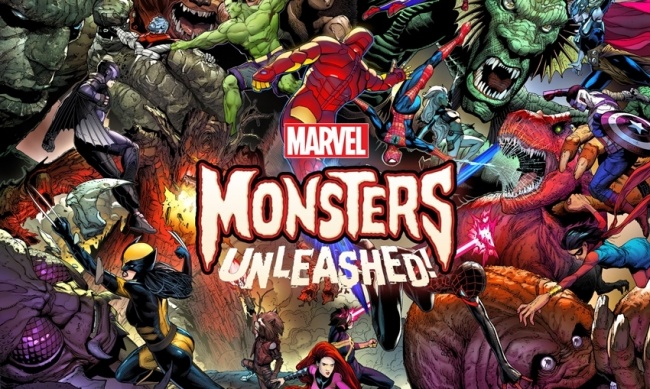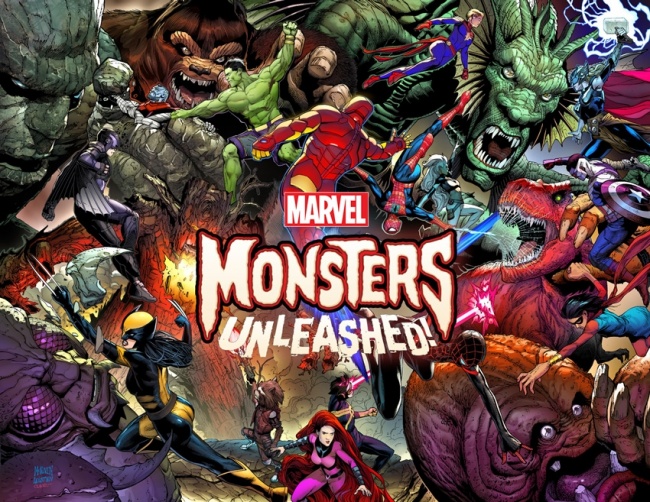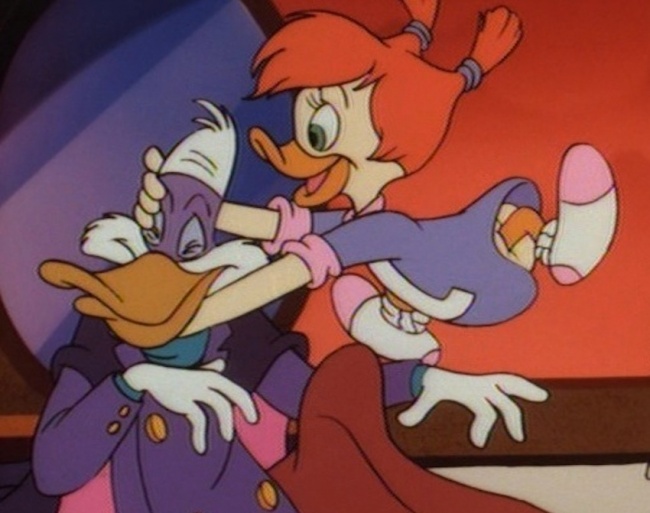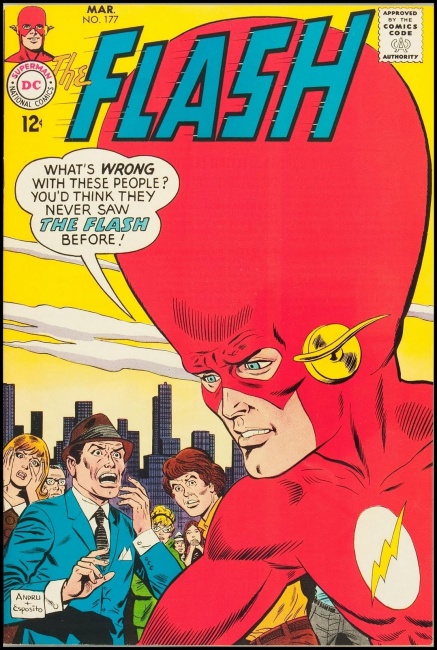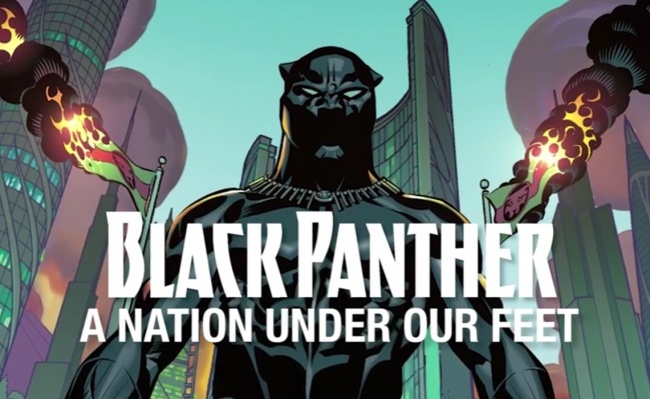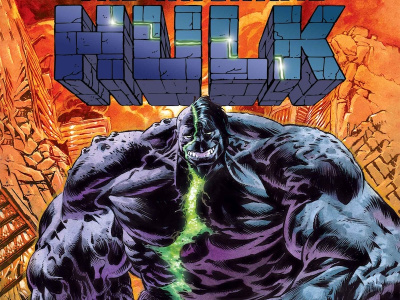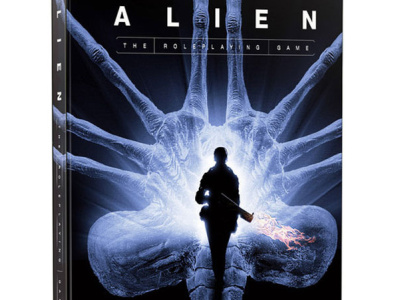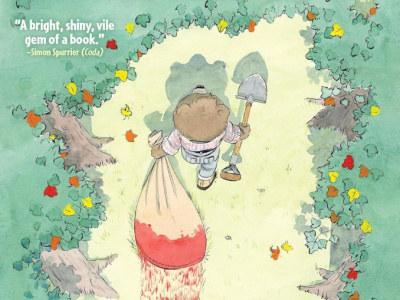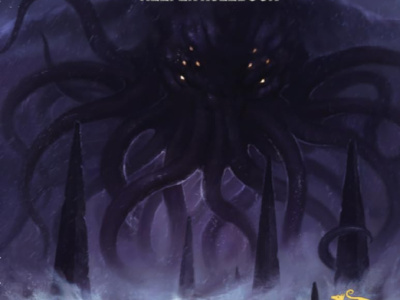As previously established, I am not what you would call a good guesser, so when Marvel teased their next big thing would have the initials MU I wouldn’t even hazard a guess. When it was revealed the letters stood for Monsters Unleashed, seeing as how I associate that title with their black and white horror magazine from the 70’s, I automatically was thinking about their standard supernatural characters. For some reason.
But when it was later revealed that the project would involve not just their kaiju (more commonly called “the Lee/Kirby monsters” by Comic Book Guys of my generation), but ALL of their kaiju, well, I squeed. So, as someone who has never missed an opportunity to criticize Marvel for their very nearly criminal underutilization of these creatures, let me just first say a sincere “thank you.” Then... let there be action figures! And a video game! And seeing as how often stories from the comics end up recycled for animation, let there be an entire season of Avengers Assemble subtitled Monsters Unleashed. Because then, and only then, will my childhood (and childish) dreams finally come true.
One of the amazing things about the internet is that you never know where you’ll go, or what you’ll know, after you click on a link. For instance, first I clicked on “G.I. Joe’: The Story of the Cartoon That Sold Wartime Heroics to a Generation of Kids”, an excellent oral history by Aaron Couch of the G.I. Joe animated series that appeared on The Hollywood Reporter. It’s full of interesting quotes from both the creators of and voice actors from the show, like Ron Friedman, creator of the original five-part miniseries and the character Lady Jaye. He’s quoted as saying, “I felt they needed more women because I knew girls who loved animation and loved superheroes... I wanted to encourage little girls, because I have a daughter, to feel that they could master that universe just as readily as a boy.”
This story had a link to another piece by Couch, “The Sign Said ‘No Jews or Dogs’, How ‘G.I. Joe’ Creator Responded to Prejudice with Inspiring Work”. In it, Friedman tells how he and his brother, the late novelist Richard Magill, grew up in Weirton, West Virginia where “anti-Semitism was on board all the way through.” One day, they went to the store where they bought their comics and found that the new owner had put up a sign: “No Jews or Dogs.” Reflecting back on the moment, Friedman said: “What gave me and my brother a sense of, ‘It doesn’t have to be this way’ was reading Superman, reading the comic books. There is a place where you can exist as who you are without fear. And if there is fear, there are champions out there to help you overcome it.”
This story had a link to another story by Crouch, “Story of ‘Darkwing Duck: The Cartoon With Heart That Brought ‘People Near Tears’,” featuring an interview with the show's creator Tad Stones. The piece gained a bit of online attention because of its shocking revelation that in spite of the fact that Launchpad McQuack starred in both, DuckTales and Darkwing Duck took place in separate universes. According to the piece, “Darkwing purposely ignored continuity, with the character having multiple origin stories within his own series.” Stones is quoted as saying, “It drives fans crazy, but I was not a huge fan of continuity. I grew up with the Silver Age continuity with the comics.” In part, Darkwing was inspired by some of the more oddball DC Comics of the era. “It was my half-remembered covers of The Flash where the Flash had a beard or was super-fat or had a giant head because he had super-evolved. It was all that in my brain saying, ‘Ok, here’s my story.’”But the part of the show that I enjoyed the most was the (in many ways ahead of its time) tender relationship between Darkwing and his adopted daughter Gosalyn. I was happy to find out I wasn’t the only one who felt that way. Stones said, “I get told at conventions how important that relationship was to people. I’ve had people near tears saying they had a rough family life and the father-daughter energy of that show was super-important to them.”
Finally, not to brag, but I do have a “serious” side, one that’s interested in politics, literature, science, and travel, so, try not to be shocked by the fact I subscribe to The Atlantic magazine. When I got my subscriber’s copy of the October issue of The Atlantic, on the back cover I found an ad for Marvel’s Black Panther: A Nation Under Our Feet Book 1 by Ta-Nehisi Coates and Brian Stelfreeze. While that may initially seem a tad incongruous for a magazine devoted to covering “news and analysis on politics, business, culture, technology, national, international and life” to feature an ad for a Marvel Comic, it does make sense. Coates is a national correspondent for The Atlantic, where he writes about culture, politics, social issues, and writing Black Panther for Marvel.The opinions expressed in this column are solely those of the writer, and do not necessarily reflect the views of the editorial staff of ICv2.com.



